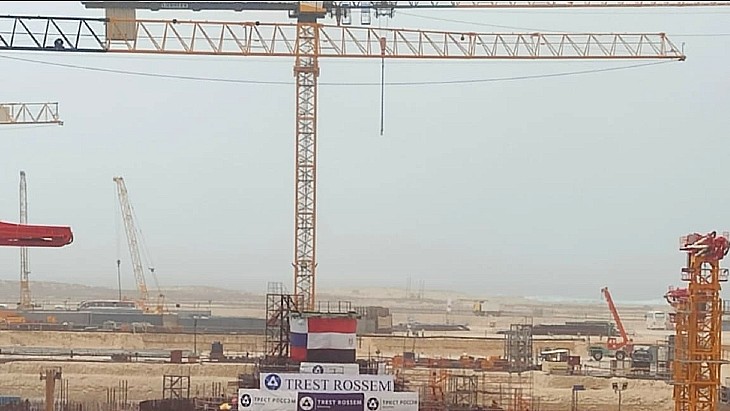Installation of El Dabaa 2's core catcher begins
20 November 2023
A ceremony has been held to mark the beginning of the installation - ahead of schedule - of the core catcher in the second unit at Egypt's El Dabaa nuclear power plant.
 The completed four unit plant is expected to meet about 10% of the country's generating needs (Image: NPPA)
The completed four unit plant is expected to meet about 10% of the country's generating needs (Image: NPPA)
The installation of the core catcher - or melt trap - was one of the construction targets for 2024 so its installation is ahead of schedule, and follows on from the installation of the first unit's core catcher in October.
The 6.1-metre diameter core catcher is a key part of the passive safety system for the VVER-1200 reactor - its function is that "in case of an emergency, it securely retains the fragments of the molten core and prevents the discharge beyond the reactor building containment".
Those attending the ceremony included the Chairman of the Egyptian Nuclear Power Plants Authority (NPPA) Amged El-Wakeel and the First Deputy Director General of Rosatom, Andrey Petrov.
El-Wakeel said that the progress on the construction "is not the result of a coincidence, but a consequence of the tireless and persistent efforts of all project participants, who worked day and night to fulfill key production events. This would not have been possible without dedication, tenacity and tireless hard work".
Petrov noted the almost parallel construction of the first two units and said: "Our project continues to develop at a rapid pace ... by the end of this year, we plan to pour the 'first concrete' into the foundation slab of the fourth power unit, thus marking the end of the preparatory period and the transition to the main stage of construction of the four-unit El Dabaa NPP. All this is the result of the coordinated work of a single team of the customer and the general contractor."
The El Dabaa nuclear power plant project - about 320 kilometres north-west of Cairo - is based on contracts that entered into force on 11 December 2017. The plant will comprise four VVER-1200 units, like those already in operation at the Leningrad and Novovoronezh nuclear power plants in Russia, and the Ostrovets nuclear power plant in Belarus.
The contracts stipulate that Rosatom will not only build the plant, but will also supply Russian nuclear fuel for its entire life cycle. It will also assist Egyptian partners in training personnel and plant maintenance for the first 10 years of its operation. Rosatom is also contracted to build a special storage facility and supply containers for storing used nuclear fuel.
Researched and written by World Nuclear News